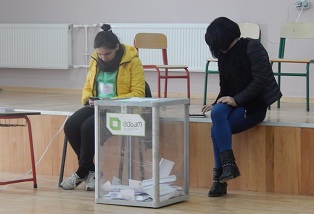The Second round of the Parliamentary Elections – evaluations of the observation organizations
November 2, 2016

Natia Gogolashvili
Propaganda around the precincts, issues related with inking procedures, intimidation of observers and interference in their activities, law competence of the election commission members were most important problems in the second round of the Parliamentary Elections as the observation organizations.
Despite the miscarriages observed in the election process, the observation organizations agree the violations could not influence the results of the elections.
9 observers and journalists of Human Rights Center accredited in the polling stations, who were deployed in three regions, filed 4 complaints and made several remarks in the log-book.
As HRIDC observers reported, the polling process went mostly in peaceful and fair environment. The violations were mostly technical and were caused by the low competence of commission members.
The HRIDC observers emphasized propaganda and agitation of the representatives of the political parties around the precincts: “the coordinators and agitators of the Georgian Dream and United National Movement were very active in the vicinities of the polling stations, who recorded people coming into the polling station that indirectly influenced their choice. Similar facts threaten free choice of voters. At the same time, on October 8, agitators, coordinators and supporters of different political parties were observed near many polling stations. Sometimes the coordinators and supporters opposed each other and similar controversies resulted into conflicts. Such conflicts undermine peaceful environment of the election process”, - Human Rights Center’s statement reads.
“The problems we have identified were related to inking (cases of casting of votes and attempts to do so by previously inked voters), marking of ballot papers in a different form (isolated cases of marking the ballot paper in a square or triangle form and of placing the voter invitation card in the envelope together with the ballot paper), threats to observers and interference with their activity/restriction of their rights, and the accuracy of the data on the badges of observers. We also identified other procedural violations, as well as 1 case of physical abuse (in Gori) and 1 case of interference with the activity of representatives of the media (in Batumi)”, - GYLA’s statement reads.
On October 30, in the second round of the Election Day, 400 GYLA observers monitored Parliamentary Elections in Tbilisi and 9 regions. The organization reported: “We should give a positive assessment to the fact that, unlike the first round of the elections, no acts of violence within the outer perimeter of precincts or cases of raiding on precincts took place on the polling day of the second round. One of the important factors for ensuring a calm and non-violent election environment was the readiness of law enforcement to provide a quick response at precincts. We should also mention the election subjects’ contribution to the prevention of tension and violent incidents”.
On October 30, over 600 ISFED short-term observers monitored voting and counting process throughout the whole country. In certain isolated cases ISFED observers identified such important violations as breach of the secrecy of vote and voting without proper inking. At the polling station #72 of the majoritarian district #66 (Zugdidi) substantial violation of the secrecy of vote was detected during the vote count. In 35 envelopes, voter invitation cards were placed along with ballot papers, making it possible to identify the voters and their votes. One of the ballot papers also had a note, confirming the fact of voting in favor of one of the candidate. In the above-mentioned ballot papers the citizens had voted in favor of the Georgian Dream. At the polling station #48 of the majoritarian district #36 (Marneuli) and the polling station #8 of the majoritarian district #69 (Lanchkhuti), voters who were previously inked were allowed to cast a vote.
Transparency International Georgia monitored the 30 October Parliamentary runoff elections with 250 observers. Our organization’s stationary observers were allocated to 197 polling stations. Moreover, 28 mobile groups monitored the process of the elections.
“In overall, the electoral process was conducted in a calm environment, the absolute majority of polling stations opened and closed on time. The drawing and counting of votes was held without any moderately seriously violations. Our observers found around 70 relatively serious procedural violations. We have filed 11 complaints. These violations could not have a significant influence on the outcome of the elections”, - statement of Transparency International Georgia reads.
The international Observatory missions also evaluated the second round of the Parliamentary Elections:
Ignacio Sanchez Amor (the Special coordinator and leader of the short-term OSCE observer mission): “The polling day went in calm environment, the election administration was better prepared, just couple of physical confrontations took place, which the investigative bodies shall investigate. Full regulation of the second tour of voting is lacking in the law. All procedures are not regulated by the law”.
Ana Gomes (head of the EP delegation): “we were concerned with the information about pressure. People were threatened to be dismissed from jobs or have subsidies cancelled in case of supporting the opposition. We understand, that a lot of similar accusations can be groundless, but we have to say, certain fear exists in this direction and we would like that relevant bodies pay due attention to it in order to avoid realization of threat”.
Ambassador Alexandre Keltchewsky (head of the OSCE/ODIHR long-term election observation mission): “the second round was more positive than first one. Media environment and broadcasting were more balanced. We emphasized that there is lack of common legal framework, which has to regulate the second round of the elections”.
News
December 13, 2023
Ethnic minorities outside the peace dialogue
November 6, 2023
‘Peace’ agenda of political parties
Popular
Articles
February 13, 2024



